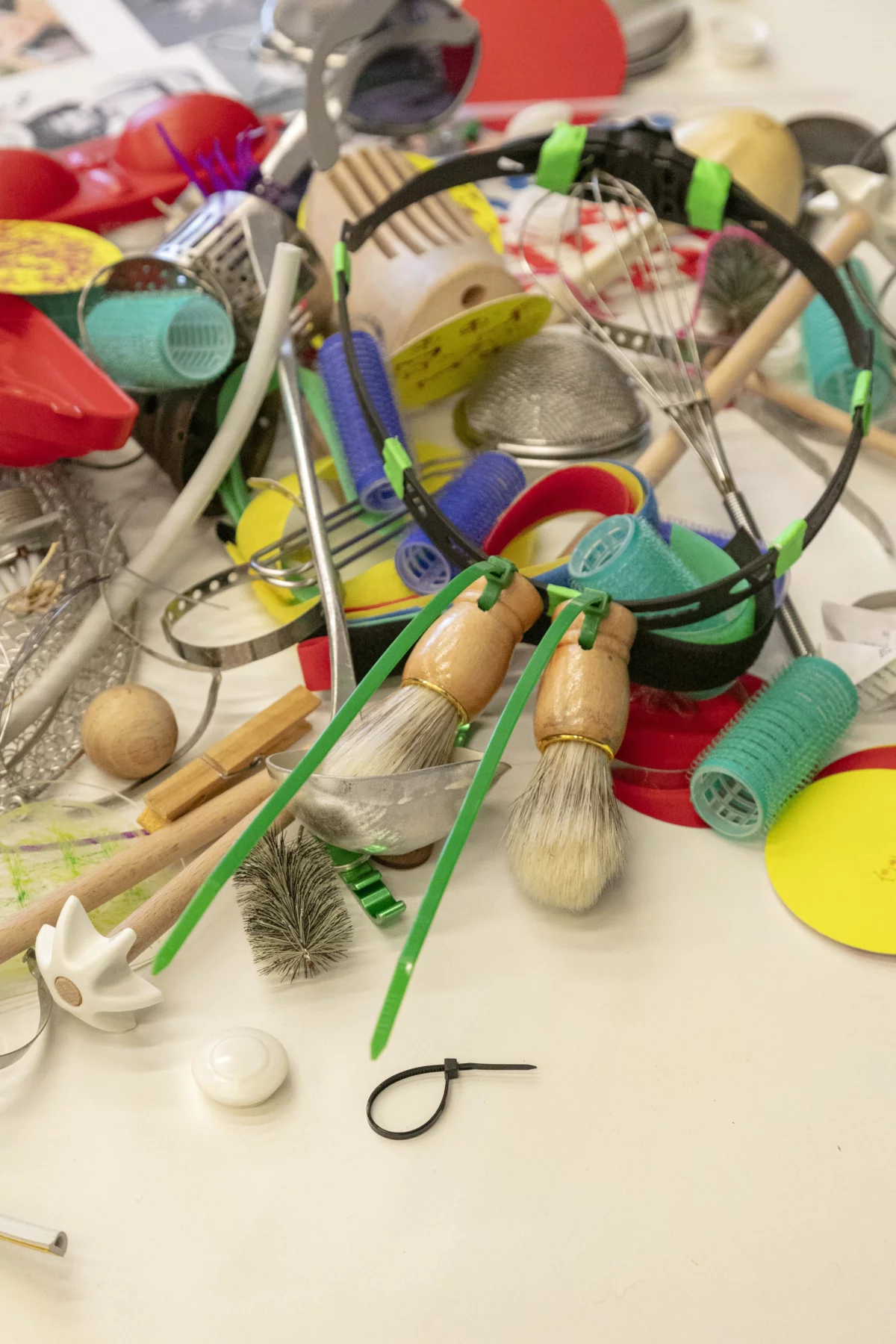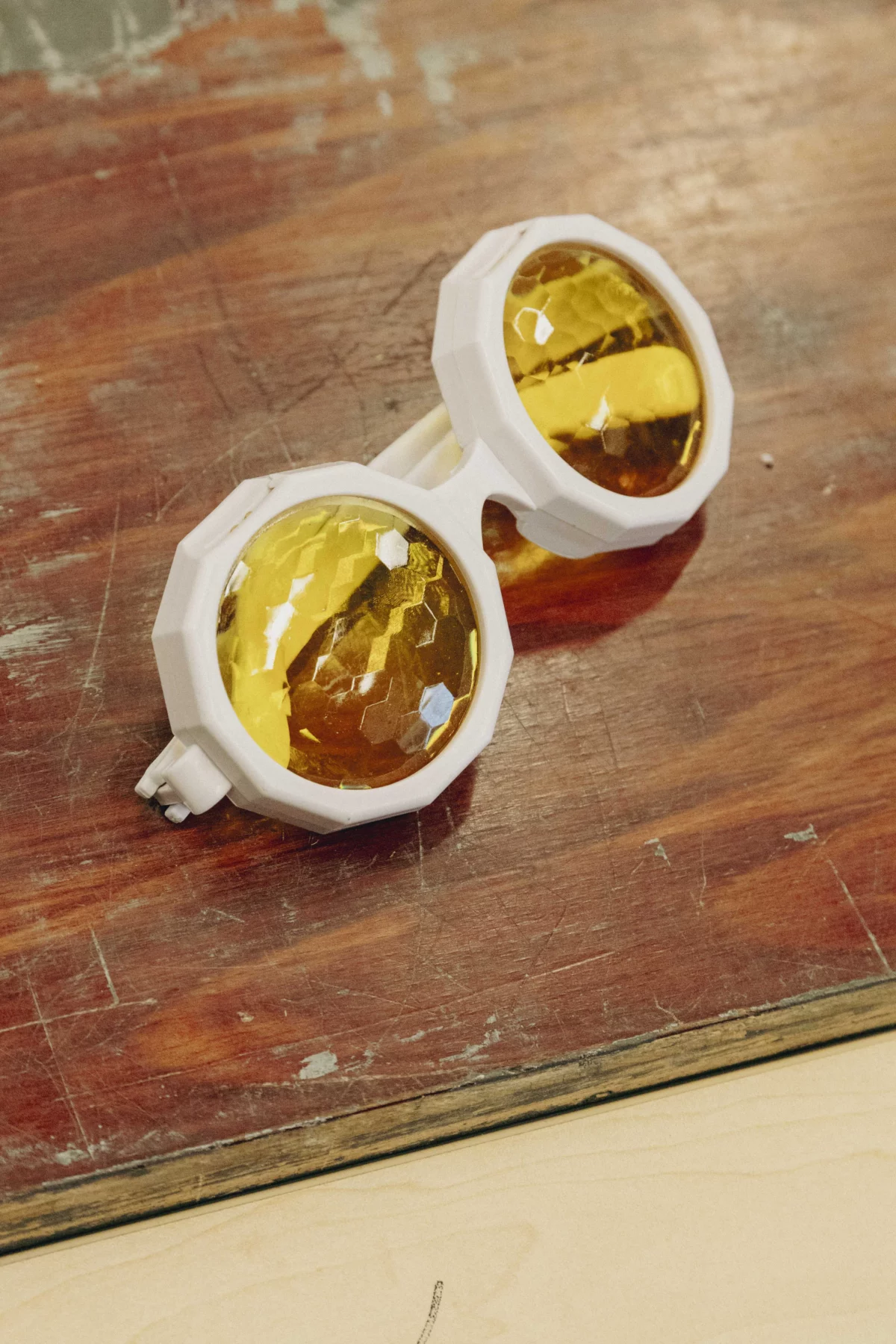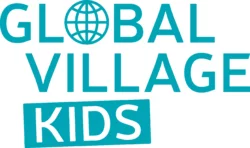With different eyes
By Ralf Stork
The debate about sustainability has long since reached the theater. In a lab presentation at the B.A.L.L., the kollektiv:proton showed just how flexibly the topic can be interpreted.
A colorful array of everyday objects lies on the pushed-together tables: Tea and sink strainers, hair curlers, cable ties, Velcro fasteners, wooden spoons, shaving brushes, protective goggles and sunglasses.
What looks like the remnants of a household clearance is actually an important part of the workshop "Spielend Nachhaltigkeit weiterdenken” “Playfully pushing forward sustainability”, in which Laura Mirjam Walter and Maria-Alice Bahra report on their cultural work with children and young people in the small town of Luckenwalde in the eastern German state of Brandenburg. The two are members of kollektiv:proton, which was founded by those with ties to Berlin's GRIPS Theater. The collective experiments with new forms of artistic processes outside the obvious theatrical areas of work. In Luckenwalde, proton has implemented two projects with children and young people in the last two years. One of these, "Uncealing Volksfeind," involved unsealing a wasteland in the town center and transforming it into a giant insect hotel with a flower meadow. In another project, entitled "Mit anderen Augen", the collective worked together with young people to explore the city streets and paths from the perspective of insects.
The household objects on the table are leftovers from this work. They were collected from junk stores and discounters. "We observed the insects, drew them and looked closely at their compound eyes," says Bahra. Using cable ties, sieves and the other objects, the children and young people were able to transform themselves into insects with antennae and compound eyes. The sustainability from the lab title can therefore also be understood quite literally: as an answer to the question of how to work in the most constructive way with used or discarded material.
 © Alexandra Polina
© Alexandra Polina
This in itself is an interesting insight for the 15 people taking part in the proton workshop at Kampnagel this afternoon. Many of them work at children's and youth theaters themselves and have a constant need for sustainable and affordable materials to create props for their artistic work.
But sustainability has many aspects. This becomes clear in the introductory round, in which everyone formulates their questions and expectations of the workshop. A frequently asked question is: How can the topic of sustainability be communicated to children and young people? Or: How can we get young people to be enthusiastic about a project in the long term? How can attention be maintained over the course of one afternoon – or even throughout a project that spans several weeks and months?
Kollektiv:proton didn't just land like a spaceship in Luckenwalde. Right from the start, there was a lively exchange with the town's institutions: "We worked closely with a local youth club," says Maria-Alice Bahra. There were also collaborations with the Luckenwalde art center "E-Werk" and a local choir. The town council was also on board right from the start. Without the town's consent and support, it would not have been possible to find the wasteland for "Uncealing Volksfeind", unseal it and plant it with greenery again.
Cooperation at an institutional level was important in order to anchor the art projects in Luckenwalde in the long term. Of even greater importance was and is the genuine cooperation between the artists, children and young people.
The GRIPS Theater places great value on participation. Laura Mirjam Walter is co-author of the book "KINDER B(E)RATEN ERWACHSENE", which was written with the help of many children and young people. The book is a plea for taking young people seriously and involving them much more in the structures of their institutions and the planning of projects. According to Walter, dealing with children and young people at an equal level is an important prerequisite for them to feel comfortable and stick with the project in the long term.
The projects in Luckenwalde were developed together with as few guidelines as possible, from the search for a suitable piece of wasteland to the best idea for converting it, from how to approach insects to the development of a town rally.
At the end of the "Mit anderen Augen" project, the children and young people organized an insect quiz at a town festival, with 300 residents taking part. The self-made insect glasses were also presented.
At Kampnagel, there is also some crafting on this afternoon: Tea strainers are transformed into compound eyes, shaving brushes become antennae and the long Velcro fasteners become a proboscis. In between, a box full of fruit and cookies is passed around. Another way to keep everyone – especially young people – happy: food!
 © Alexandra Polina
© Alexandra Polina
During the reflection round, the participants look at their unique glasses and sculptures with great satisfaction. And at the very end, another aspect of sustainability was touched upon: the importance of a permanent presence in the town. Every project comes to an end at some point. In the worst-case scenario, a relationship of trust that has only just been established between artists and young people can come to an abrupt end. Until the next project application and the next grant, which is never quite certain. In Luckenwalde, however, the collaboration with young people and the kollektiv:proton will continue. A new project is already being prepared.
The project "Mit anderen Augen" and the workshop "Spielend Nachhaltigkeit (weiter)denken - Arbeiten für und mit Jungem Publikum" by kollektiv:proton were funded by the GLOBAL VILLAGE KIDS funding program of the Fonds Darstellende Künste as part of "Kultur macht stark. Bündnisse für Bildung" program funded by the Federal Ministry of Education and Research.
Ralf Stork arbeitet als Natur- und Wissenschaftsjournalist in Berlin. Er publiziert unter anderem für die Magazine Natur und Spektrum der Wissenschaft. Sein Interesse gilt der Vermittlung von Nachhaltigkeitsthemen und der Bedeutung von Biodiversität.

